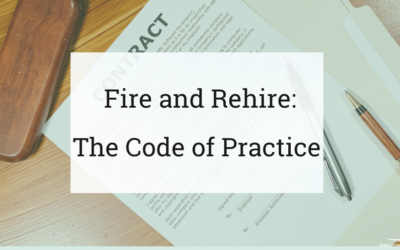An employment relationship is usually terminated in one of two ways: a resignation or a dismissal. We explain both below but the purpose of this blog is to examine what happens when an employer says “resign or be dismissed” or tries to force a resignation from an employee.
What is a dismissal?
A dismissal is the employer ordering an employee to leave the business. If not carried out properly by following a fair process and having a fair reason to dismiss, it could become a complex matter in which an ‘unfair dismissal’ claim could arise. This is expensive in terms of legal fees and potential compensation for the ex-employee.
What is a resignation?
A resignation is when an employee ends their employment. When an employee resigns, they are telling the employer they no longer want to work for them. A resignation can either be verbal or in writing. You should always seek advice prior to undertaking formal procedures. A redundancy is still a dismissal and failing to properly carry out the process can lead to unfair dismissal claims in the employment tribunals.
“You have two options: resign from your employment or you will be dismissed.”
In the heat of the moment, many employers will inform an employee who is accused of misconduct that they can resign or be dismissed. Often, the employer thinks they are being nice: “it’s better to have a resignation than a dismissal on the employment record” are words we often hear!
Unfortunately for employers, it doesn’t pay to be nice!
Offering an employee the chance to resign instead of being dismissed amounts to a dismissal! As soon as the words are uttered (verbally or in writing) they amount to a dismissal and the problem for employers is that it amounts to an unfair dismissal!
It makes no difference if the comment was made by the employer in the heat of the moment.
If the employee accepted the options and wrote a resignation letter “I’m sorry for my conduct, I resign…” and appears to be in agreement with the decision to end the employment it would still be an unfair dismissal! Unfortunately for employers, the dismissal takes effect before the resignation.
What is an unfair dismissal?
An unfair dismissal is one where an employer has ended someone’s employment without either following a proper procedure or having a fair reason to dismiss.
There are only 5 fair reasons to end someone’s employment and each reason has its own process to follow. All of the fair reasons involve being in discussion with the employee, ascertaining their point of view and a fair review of all information.
In saying to an employee “resign or be dismissed” there is no fair discussion and no other option than the employment ending. It is a predetermined decision and that makes the comment:
- A dismissal; and
- An unfair dismissal
“But It’s An Easy Option!”
Allowing an employee to resign as opposed to being dismissed is obviously an “easy solution”, after all it is:
- Initially stress free
- requires no meetings;
- requires little work, effort or time to ensure the employment is terminated.
However, asking an employee to resign or be dismissed has some serious legal implications, it provides the employee with an unfair dismissal claim which could cost employers up to one years salary in compensation (subject to some limits) and a large amount in legal fees..
Subject to the extent of the misconduct which lead to the comment, there are some legal arguments we could make on your behalf to reduce any compensation but it’s not a great position for an employer to be in! Trust us when we say that the stress will come later!
It’s definitely not an easy option!
What should I do?
How can employers sack someone safely? Here are our top three tips:
- Do not inform employees that they have to resign or be dismissed;
- Conduct a disciplinary process if you discover misconduct;
- Take advice from your lawyers at Employment Law Solutions on how to safely dismiss staff.
The chances are that if the employee has committed an act of misconduct and they know their job is at risk, they will resign when they receive an invitation to disciplinary hearing. We can assist to draft an invitation to a disciplinary hearing with sufficient detail which not only meets legal requirements but ramps up the pressure on the employee (fairly!).
“I’ve put my foot in it…”
If you are a business who has issued the ultimatum of “resign or be dismissed” … do not panic! There are immediate steps you can take to mitigate any risk to the business and we’d love to have a quick chat to explain more. We’re a friendly bunch and can promise you that no matter your situation, we’ve heard it before! We offer 24/7, 365 guidance providing stress-free, pragmatic solutions to your problems. Our mission is to help you concentrate on what you do best – running your business.




